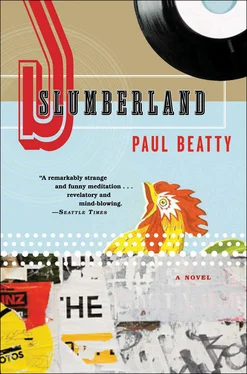On a bright August day in 1962, Klaus shyly offered his musician friend an oily wedge of steamed shiitake sautéed in garlic butter. Other than the gizzards his grandmother used to make on Easter Sunday, the mushrooms were the only delicacy the Schwa had ever tasted. The Schwa looked into his friend’s eyes, expecting to see satisfaction, and found rheumy, hazel-colored apprehension blinking uncontrollably back at him.
“The end is near, my friend.”
“What?”
“The end is nigh.”
He could see that Klaus was serious, so he grabbed one more piece of the tasty mushroom cap before asking, “How near is nigh?”
“Tomorrow,” he said.
A confused Schwa chalked up his friend’s apocalyptic mind-set to the rigors of an overwrought empirical methodology, and watched him walk west, disappearing into the afternoon glare. The next morning when he decided to go to the city’s American zone to pick up some of the bananas that, along with nylon stockings and political satire, were becoming increasingly harder and harder to find in the east, he found that he couldn’t leave. The Berlin Wall had been erected. The border guards who once begged him to tell stories about Bud Powell and Chick Webb now pointed guns at his chest.
Tuesday. In a panic he ran to the Prater thinking about the p ’s he’d never see again: Pittsburgh, Patti Page, Satchel Paige’s palm ball, Bob Petit’s pump fake, PayDay candy bars, pizza, the Pacific, Pontiac cars. Gabi sat alone at the table. She had garlic-buttered shiitake on her breath.
Perpetuity , she said, sliding a pen and exclusive lifetime recording contract with the German Democratic Republic toward him. The Schwa quickly signed and left it on the table. Gabi thanked him and went to her grave never mentioning that other p-word, pregnancy . Stone liked to think that he had sacrificed his freedom for hers, but in truth he signed because the Wall inspired him like the Skinner box inspires the rat. He spent the next thirty years as an operant-conditioned jazz musician circumnavigating the boundaries of his box, pressing psychic levers and retrieving his retrieving rewards.
Sometimes he explored the sections of the walled border that divided East and West Germany, a barrier fifteen feet high and nearly nine hundred miles long that ran from the northwest tip of Czechoslovakia to the Baltic Sea. The Wessies euphemistically referred to it as the Innerdeutsche Grenze , or Inner German border. The paranoid Ossies didn’t have time for such Cold War genteelism. The Antifaschistischer Schutzwall was what it was, the Anti-Fascist Protective Wall, a rampart against bullshit. It felt good to be trapped.
Legend has it that Sonny Rollins honed his chops on the Brooklyn Bridge; well, Charles Stone found his voice while seated at the base of a moss-covered tree stump, moved by the absurdity of a metal wall bisecting scenic Lake Schaal.
It never dawned on me that Charles Stone was the only artist on Kill the Czar Records, a small self-distributing label supposedly based out of that bastion of ultraleftism, Ann Arbor, Michigan. Maybe the East Germans saw the Schwa as a jazz earwig who’d crawl down the American ear canal and lay eggs of indoctrination in our brains, turning us into mindless Manchurian Candidates. I’m told Charles Manson, Squeaky Fromme, Big Bird, Huey Newton, and Henry Kissinger were all big fans.
Maybe the East Germans viewed him as a sort of socialist van Gogh, an undiscovered iconoclast whose transformative genius, though destined to be unappreciated in his lifetime, would one day come to define their great society. As Rome had been to the Renaissance, Paris to the Age of Enlightenment, Greenwich Village to postmodernism, so would East Berlin be to the glorious Age of Unpopular Antipop Populism.
To everyone’s (except the Schwa’s) disappointment, Lars’s interview didn’t result in the expected tsunami of adulation. There was some talk of selling the movie rights to his life to Oprah Winfrey.* But in the end, the only places where the article caused a serious stir were among the jazz cognoscenti and in the avant-garde and arrière-garde †communities.
In order to meet the needs of his faithful, we installed the Schwa in a corner booth at the Slumberland. And for two months every free-jazz musician, alternative rapper, filmmaker who’d never made a film, and disgruntled downtown poet whose epigraphs were better than his poems and whose poems were better than nothing made the hajj to the Slumberland to pay tribute. The list of pilgrims was like a who’s who of unknowns who among the counterculture homeless are household names: Steve Lacy, Billy Bang, Bern Nix, Milford Graves, Anthony Braxton, William Parker, Cecil Taylor, David S. Ware, Peter Brötzmann, Jameel Moondoc, Butch Morris, Henry Threadgill, and many others.
Those men of my father’s generation, especially the black men, were a different breed. Fiercely independent, brilliant, and slightly touched, they were the type who’d represent themselves in court — and win. Children of the civil rights movement, they were the first generation of African-Americans with the freedom to fail without having to suffer serious consequences. They’re the Negronauts the black race sent off into the unexplored vastness of manumission.
Race, the final frontier. These are the voyages of the mother ship Free Enterprise. Its five-hundred-year mission: to explore strange, new, previously segregated worlds, to seek out new life and new civilizations, to boldly go where no niggers had gone before .
And like the first men to walk on the moon, to have gone where no man has gone before, these men, if they come back at all, come back changed. They come back humbled. Discouraged that they’d seen all there was to see and that it didn’t amount to much. Yet finding out the Schwa was still alive had restored their optimism, and many of them, after they’d left the bar, would go on to do some of their best work. The Schwa had touched all these men just as he’d touched me and Philip Glass.
Lars tells a story. In 1971, Philip Glass goes to see the Schwa in Antwerp, and during the hour-and-forty-five-minute set the band plays a total of four notes, one chord change, an accidental cough, and a chorus of room-tone nothingness interrupted only by the drummer accidentally dropping his sticks and the bassist tapping his toe twice out of habit. Afterward Glass, then in his mid-thirties, still in search of his minimalist musical voice, and thinking of giving up the keyboards for sheep farming, approaches the Schwa backstage to offer his heartfelt congratulations. To his surprise, Stone is sulking in the corner, quietly cursing himself and his instrument. Glass asks the Schwa why he’s so disappointed after such a wonderful, groundbreaking performance. A little too rock ‘n’ roll , the Schwa says, a little too rock ‘n’ roll . Glass nods and complains how his synthetic nothingness felt forced, scripted. That his music was neither improvised nor natural but was what was on his mind and not what was in his mind. Glass and Stone go out to the piano, the bouncer is trying to empty the club of stragglers, but Belgians are as stout as their beers and they aren’t leaving. Glass sits down to play, and thirty-two bars of that pounding serialism crap does the bouncer’s job for him. The place empties. Glass looks sickly. Van-Gogh-self-portrait-with-the-bandaged-ear sickly. Billie Holiday sickly.
Kurt Cobain “It’s better to burn out than fade away” sickly. The Schwa takes out pen and paper and writes out a prescription. “Beckett.” That’s all the paper says. “Beckett.” First thing the next morning, Glass runs out to Standaard Boekhandel on Huidevettersstraat off the Meir. When he enters, the ring of the bell above the door is nothing; he barely hears it. When he exits, Godot, The Collected Poems in English, Rough for Theater, Krapp’s Last Tape in hand, the ring of the bell above the door is nothing happening twice, and Philip Glass understands minimalism.
Читать дальше












